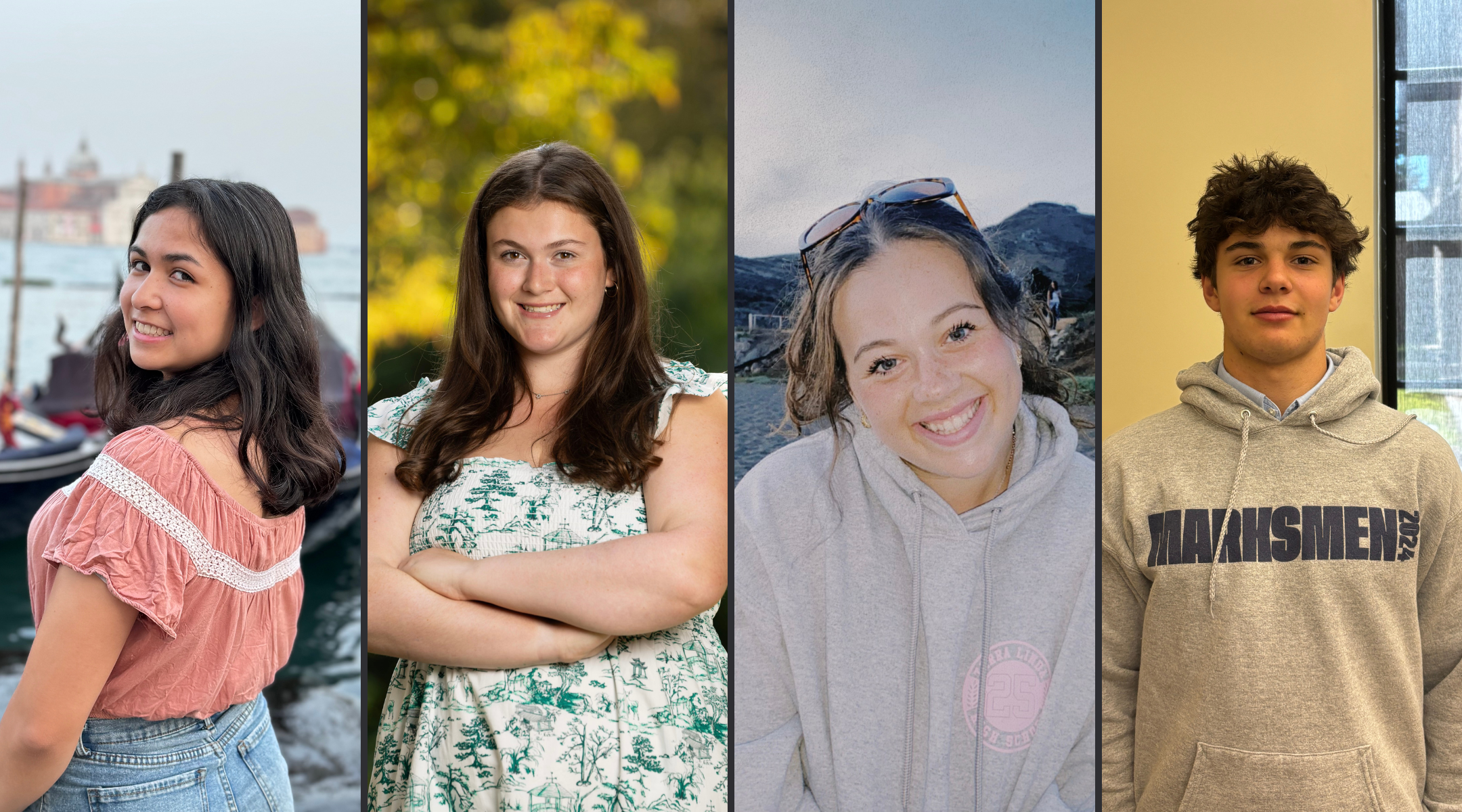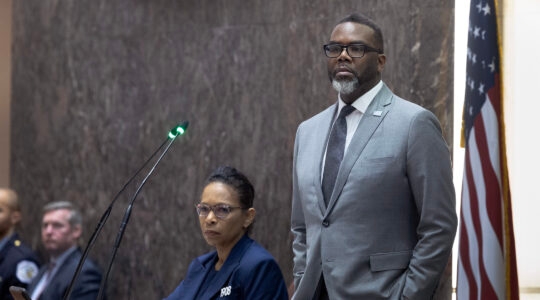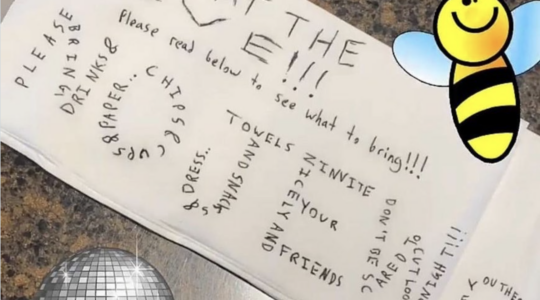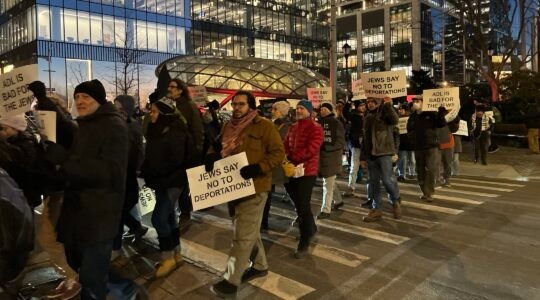This article was produced as part of JTA’s Teen Journalism Fellowship, a program that works with Jewish teens around the world to report on issues that affect their lives.
College campuses continue to places of uncertainty for many Jewish students, though the pro-Palestinian protests that roiled campuses and led to accusations of antisemitism following Oct. 7 appear to have leveled off. For Jewish high school seniors who are trying to decide where to spend the next four years of their life, the question of safety and Jewish identity play a key role in the application process that’s currently underway.
The Jewish Telegraphic Agency sat down with four Jewish high school seniors from across the U.S. to hear their perspective on how the protests and their aftermath affected the college application process. The conversation touched on how they wrote about their Jewish identity in their applications, and the importance of Jewish organizations on campus and a school’s response to anti-Israel protests. What follows is an abridged transcript of the 48-minute discussion, edited for clarity.
How did you decide what colleges to apply to?
Eliana Soiffer (Brookline, Massachusetts): One of the things I wanted was to be either in or near a major city. I just don’t want to be in the middle of nowhere. I’m also part of a gymnastics team. Pretty much every school on my list has one.
Hayden Cohen (Westchester, New York): I’ve really wanted a school that’s in a college town. I was looking for undergraduate populations of around 5,000 students to around 20,000. I also want schools that have Greek life, but it’s not a huge part of their environment.
Teddy Fleiss (Dallas, Texas): A big difference for me was in-state tuition versus private institutions. So I guess I would see how to decide between those as the acceptances and rejections come in.
Isabelle Stavsky (Marin County, California): Class size is a big thing for me. So a lot of the schools that I’m applying to have 30 to 40 kids in a class rather than just massive lecture halls. I feel like it’s gonna be really helpful to get to learn the material in a smaller environment.
How have campus protests affected your choice of colleges?
Stavsky: I have been looking at how the schools have been handling it, because I definitely think that that says something about the place and the support that you will get as a Jewish student. I’m not necessarily crossing schools off of my list because they’ve had protests or incidents, because that’s kind of everywhere now.
Cohen: I’ve tried to look at the strength of the Jewish community. There can be so much hate on campus, but at the end of the day I’m not joining them; I’m joining the Jewish community. I want to feel comfortable in a place that makes me feel at home and doesn’t make me scared, doesn’t want me to go back to Westchester because I’m frightened to be on campus.
Soiffer: I did cross one school off my list entirely, and that was Columbia. Columbia was never really my favorite, and I think their situation was too much for me. There were protests in most places [so] I’ve been trying to talk to students: Did you feel safe? Did you feel supported? Did you feel like you had a community? I think if I was going to limit myself to only places where it was completely shut down, or there were never protests, I wouldn’t have enough options.
Fleiss: I toured Vanderbilt last January. On my tour, there were a lot of signs about what Israel was doing badly, and that kind of turned me off initially. But it was a Friday, so I went to Chabad with my family, and I saw how connected the Jews were with one another, and how nice the community was. I talked to them about the protests, and they said, “Yeah, they sucked, but it brought us together, and it wasn’t too bad.”
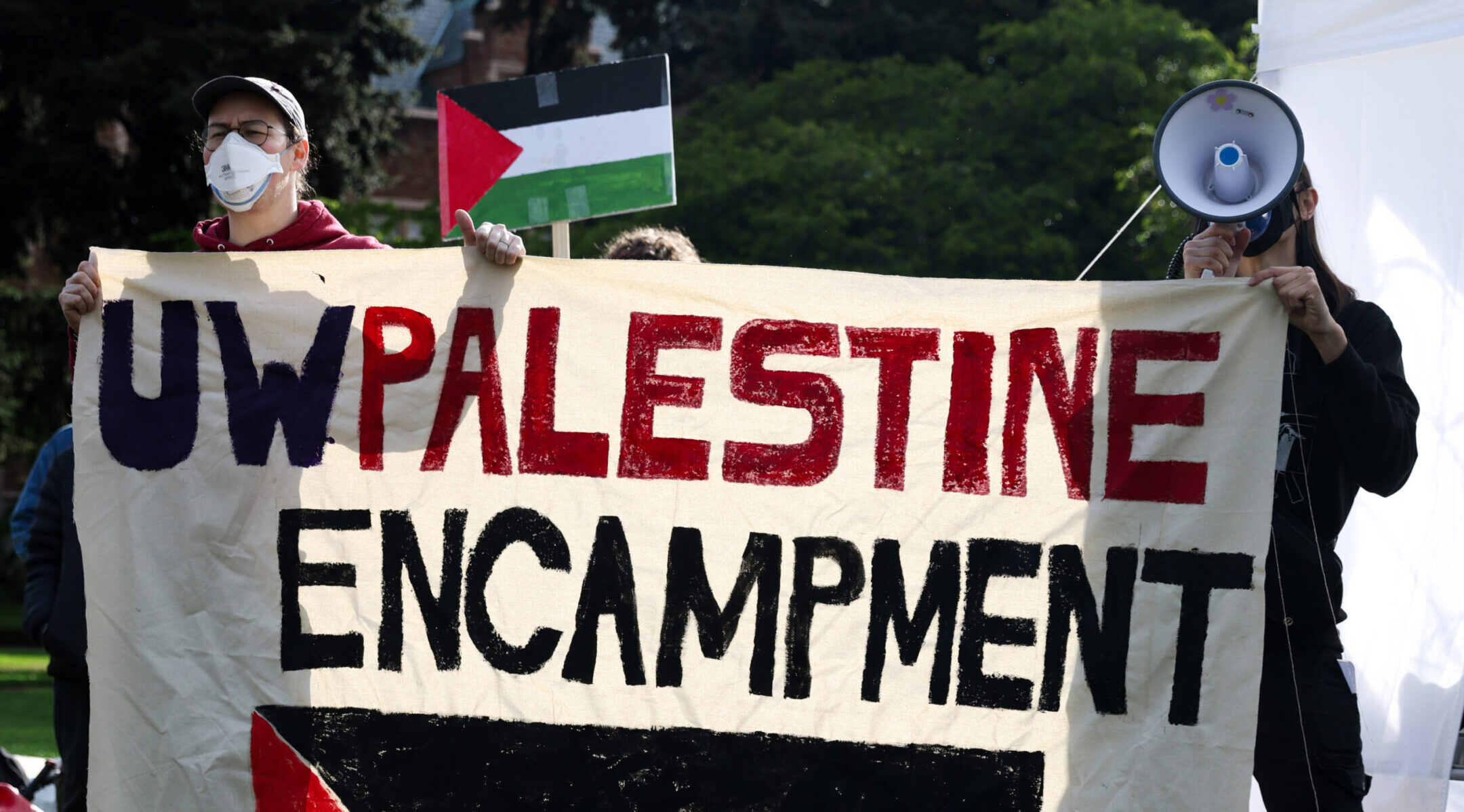
Protesters lead a chant during a pro-Palestinian anti-war encampment on the campus of the University of Washington in Seattle, April 29, 2024. (Noah Riffe/Anadolu via Getty Images)
How did Jewish life on campus, like Chabad and Hillel, play into your decisions?
Soiffer: I’ve looked more specifically for Hillel, because I’m not super Orthodox. I’ve been asking: Is the Hillel on campus pretty central? Or do you have to walk 20 minutes off campus to find it? I’m not kosher, but Hillel at UPenn used to charge a surcharge over the typical meal. If you were kosher, you could only eat twice a day on a full meal plan. They only recently changed that in the wake of the protests. Maybe because people thought, “Hey, maybe you should treat your Jews a little better.” I feel the need to look at granular details like that: How prioritized are Jews on campus?
Stavsky: Something I’m really trying to focus on is having a community that’s going to be a safe space, and that’s going to be somewhere that you can talk about your experiences, or have support, or meet people who have been on the campus for longer than you have, and have dealt with these protests.
How does the size of Jewish population on campus affect your choice?
Cohen: I just care about quality, even if the Jewish population is 5% or 2% of the population. If it’s strong, and people are showing up to Hillel or Chabad events, that shows me that there are people who care. It is important that there is a core group of Jews who are going through all this programming and taking part in Jewish life on campus.
Soiffer: I haven’t been specific about a minimum percentage or anything. But, at some schools like Tulane, it’s been encouraging to know that, when you go there, someone in your hall is going to be Jewish.
Fleiss: I honestly don’t know if I’ve ever looked up a percentage of Jewish students on a campus. And, that may be kind of stupid of me, but I figured that a lot of the more prestigious schools have pretty good historical Jewish representation, and they all have Hillels and Chabad. So obviously, they have some semblance of a Jewish community.
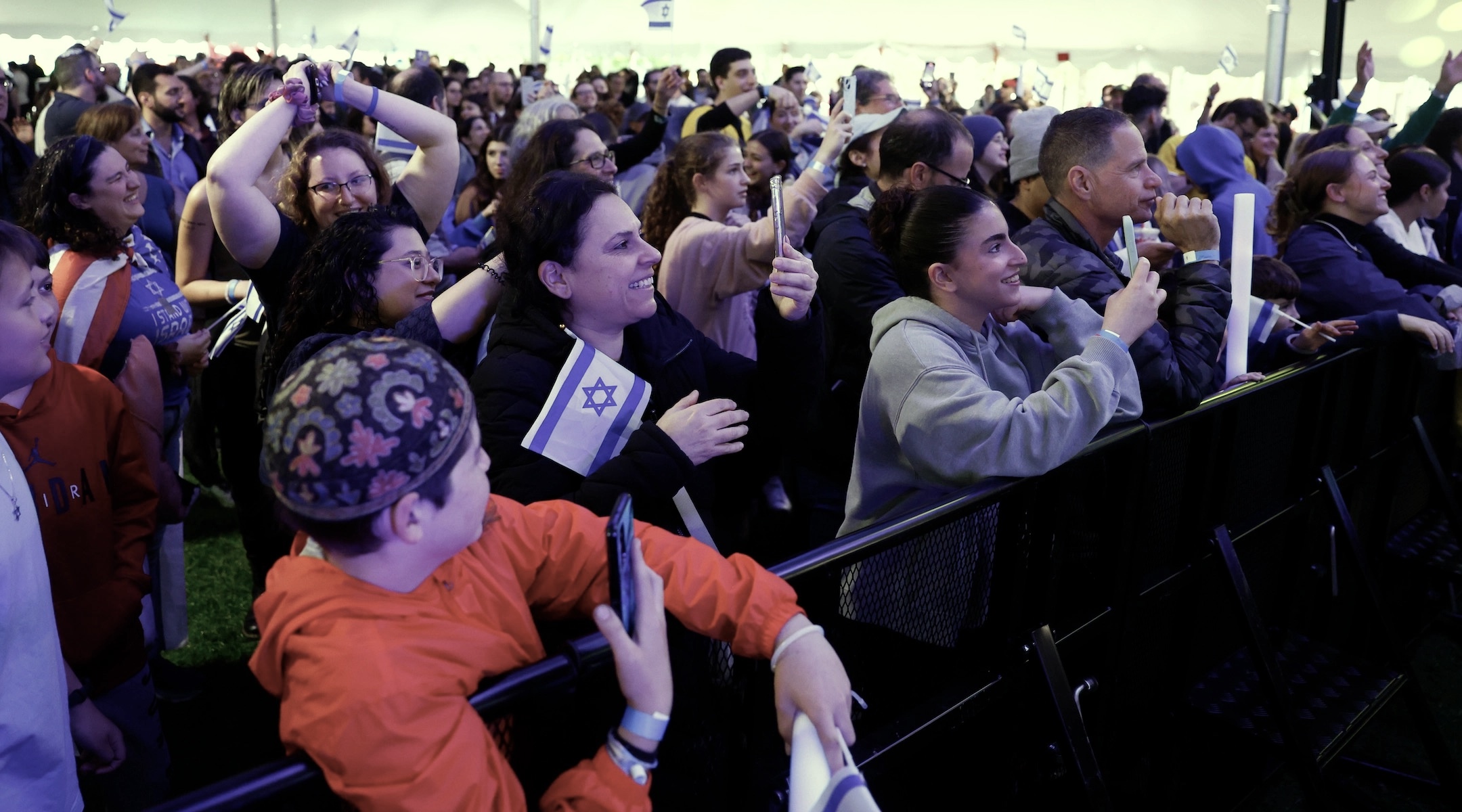
A crowd watches rapper Kosha Dillz perform during the “We Will Dance Again” event presented by MIT Hillel in Cambridge, Massachusetts, May 16, 2024. (Danielle Parhizkaran/The Boston Globe via Getty Images)
What feedback or pressure did you get from your parents about applying to colleges?
Stavsky: My parents probably have been a little more paranoid throughout this process than I have. My parents went to Yeshiva University and its Stern College for Women, so they didn’t have to deal with this. I guess it’s scary that your kid’s going to be away from home and you’re not there to help them. And college campuses, these bubbles away from home, have stuck out in our country as places where there’s really concentrated protests and hate.
Fleiss: They’re not worried about my safety, really. It’s more about if I feel comfortable being Jewish at the school.
Soiffer: My parents haven’t exerted a ton of pressure beyond what I feel. The one thing I will say is, my older sister just went off to college. She’s at UChicago, and she’s only been there for three weeks or so, and my parents have been exerting a lot of pressure on her to really get involved in the Jewish community, which is not a bad thing. But she’s also trying to explore all of her options and try new things as well, and it’s been a little bit of a clash.
Did anyone go on any college visits that showed them really good things, or really not great things about a specific school in light of a Jewish lens?
Stavsky: Last Thanksgiving, pretty soon after Oct. 7, protests were really really big on a lot of campuses. I went down to Southern California to tour schools like UCLA, UC Santa Barbara, and California Polytechnic State University. We visited the Hillels, and that was definitely comforting to see a community, but there were also protests everywhere. I wear my Magen David every day. That was one of the first times that my mom and I took off our stars because we felt uncomfortable with how many protests there were on a lot of these campuses. That was a really surreal feeling. It was one of the first times where I realized that it’s a conscious decision I have to make to put on my Jewish star or not to put it on.
Cohen: I was visiting a couple of schools in Pittsburgh, and there was a big courtyard with a protest going on. As I was walking down the street, there were a couple of people on bikes who said “let’s go join in.” That was a huge shock to me, that people are just joining in, even if that’s not their number one priority. That was a little bit scary. But there have been other schools where an older friend who goes there took me to the Chabad and Hillel, and I realized how many Jews know each other and how it’s a really strong community.
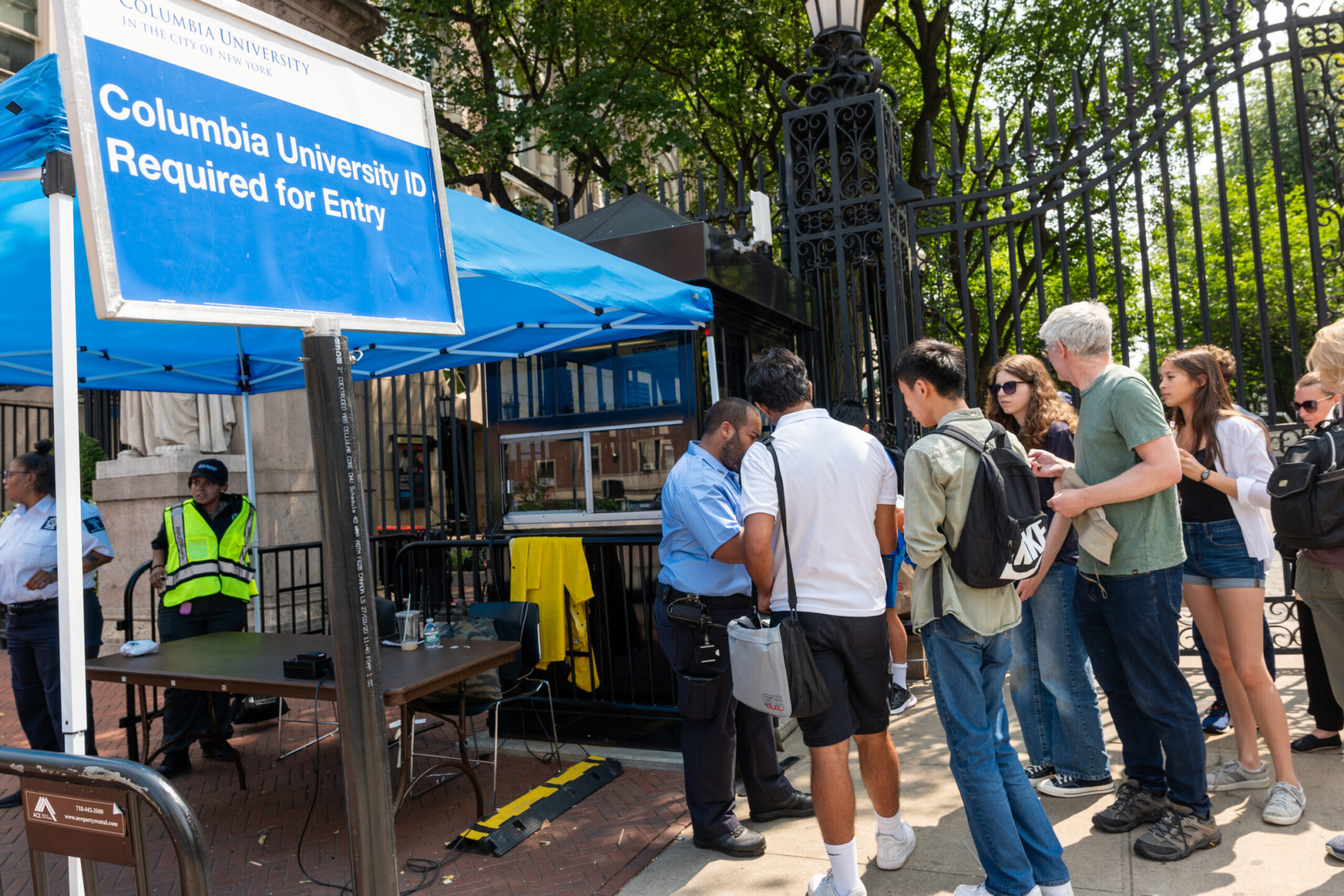
Students, faculty and others wait to enter Columbia University’s campus after the school instituted new security rules before the start of the academic year, Aug. 15, 2024. (Spencer Platt/Getty Images)
My next question is a little bit more focused on the applications themselves. How have you thought about representing your Jewish identity in your application?
Cohen: I want schools to know that I’m Jewish, and that I will make an impact for Jewish students, because that’s who I am. So I take any chance I get. I go to Jewish day school. It’s an important part of my identity. So schools should know it, and my identity should be reflected in my application.
Stavsky: I definitely had that question. I don’t think if I was applying to college two years ago, I would have questioned talking about my Judaism, because it is such a big, defining piece of my life. I think that then, I would have done it without a thought, but I definitely did have to think about it. I came to the conclusion that I’m not going to hide part of myself.
Soiffer: Judaism hasn’t really come up in any of my essays, and that’s partly because, for a lot of the identity essays, I end up writing about something else. I’m mixed: I’m part Filipino, part Mexican, part Moroccan. It leaves me a lot of options to write about. I’m not going to intentionally remove it. I just feel a little nervous about completely putting it out there in my essays.
What is the number one most important thing that goes into your decision from a Jewish lens?
Fleiss: The number one most important thing for me is the involvement in Chabad and Hillel, because to have those people who are Jewish and will support you the whole time you’re on campus is really important to me. I think that matters a lot more than university stance on the issues or anything like that.
Cohen: For me, the focus has been that people are grounded in their Judaism and in their Zionism, and they’re not afraid to speak out. If Jews are just going to hide in their dorm rooms when there’s a protest, they aren’t doing anything productive for the Jewish people. I really want people who are not afraid to speak out.
Did you end up applying to the schools where you took off your Magen David before visiting?
Stavsky: It was right after Oct. 7, and we saw protests, we saw posters, but we weren’t yelled at or anything. Before we went to that campus, we were just unsure, and took the necklaces off. Now, I talk about not taking my Magen David off and how proud I am in my Common App [essay]. It’s such a little thing: taking off your necklace. There can be a conscious “I can’t wear this because it’s showing them who I am.” It’s so much more than a piece of jewelry. Just that fact that I had to think about needing to hide that I’m Jewish felt so crazy to me. Five of my great-grandparents are Holocaust survivors, and their stories are ingrained in my family. It was really a wake-up to think about hiding my Judaism like they did. It shows the reality of how serious these times are.
JTA has documented Jewish history in real-time for over a century. Keep our journalism strong by joining us in supporting independent, award-winning reporting.
